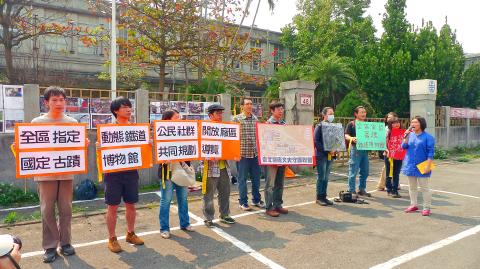The Ministry of Culture yesterday announced its decision to designate the Taipei Railway Workshop as a national cultural heritage site, marking a long-awaited victory for cultural preservation groups.
The decision signaled an abrupt halt to earlier development plans proposed by former Taipei mayor Hau Lung-bin’s (郝龍斌) administration, which originally allocated 57 percent of the 17-hectare site for commercial use.
Cultural Heritage Bureau director-general Shy Gwo-lung (施國隆) yesterday said that the compound would be preserved in its entirety, while the historic workshop itself would be renovated to house a railway museum.

Photo: Yu Pei-ju, Taipei Times
Constructed in the 1930s during Japanese colonial rule, the Taipei Railway Workshop was known as the “hospital” for the nation’s trains, and considered the most important railway maintenance depot in Taiwan.
The compound features a diverse range of architecture, including an engine room and a Japanese-style bath house, as well as lush vegetation.
Announced in September last year, original plans for the site provoked a prolonged campaign spearheaded by cultural preservation groups and railway enthusiasts, who said that the compound should be preserved in its entirety to preserve knowledge of the maintenance process.
Although several buildings within the compound were designated as historical monuments through successive campaigns in 2000, 2012 and 2013, the compound as a whole lacked adequate protection, the activists said.
“The importance of the Taipei Railway Workshop lies not only in its architecture, but also in its role as an assembly line for industrial production and its role within the context of an industrial landscape,” activist Huang Li-ping (黃立品) said.
Proposed commercial uses for the compound also stoked anger among nearby residents, who said that local infrastructure would be inadequate to accommodate a massive influx of tourists and shoppers to the area following the construction of the Songshan Cultural Park and the Farglory Dome project nearby.
Earlier yesterday morning, members of the Taipei Railway Workshop Heritage Conservation Union congregated outside the site, demanding that authorities help to protect the compound and increase public participation in future plans.
In a symbolic gesture to offer their blessing to the beleaguered site, dozens of activists and their supporters tied yellow ribbons to the fences that surround the compound.
Meanwhile, the Taiwan Railways Administration (TRA), which would prefer to develop the site to fulfill its needs, was not happy about the decision.
TRA Deputy Director-General Chung Ching-da (鐘清達) said that the Cultural Heritage Preservation Act (文化資產保存法) holds the owner of the property responsible for managing and maintaining a historical site, adding that the managing and maintenance of a historical site was not the railway operator’s forte.
Nor did the administration have the manpower and funding to preserve the historical site, he said.
“They only know how to give birth to the child, but they are not raising it themselves,” he said of the activists, adding that different agencies should share the burden of preserving the historical site in a more reasonable and responsible manner.
Additional reporting by CNA

Chinese Nationalist Party (KMT) Chairman Eric Chu (朱立倫), spokeswoman Yang Chih-yu (楊智伃) and Legislator Hsieh Lung-chieh (謝龍介) would be summoned by police for questioning for leading an illegal assembly on Thursday evening last week, Minister of the Interior Liu Shyh-fang (劉世芳) said today. The three KMT officials led an assembly outside the Taipei City Prosecutors’ Office, a restricted area where public assembly is not allowed, protesting the questioning of several KMT staff and searches of KMT headquarters and offices in a recall petition forgery case. Chu, Yang and Hsieh are all suspected of contravening the Assembly and Parade Act (集會遊行法) by holding

PRAISE: Japanese visitor Takashi Kubota said the Taiwanese temple architecture images showcased in the AI Art Gallery were the most impressive displays he saw Taiwan does not have an official pavilion at the World Expo in Osaka, Japan, because of its diplomatic predicament, but the government-backed Tech World pavilion is drawing interest with its unique recreations of works by Taiwanese artists. The pavilion features an artificial intelligence (AI)-based art gallery showcasing works of famous Taiwanese artists from the Japanese colonial period using innovative technologies. Among its main simulated displays are Eastern gouache paintings by Chen Chin (陳進), Lin Yu-shan (林玉山) and Kuo Hsueh-hu (郭雪湖), who were the three young Taiwanese painters selected for the East Asian Painting exhibition in 1927. Gouache is a water-based

Taiwan would welcome the return of Honduras as a diplomatic ally if its next president decides to make such a move, Minister of Foreign Affairs Lin Chia-lung (林佳龍) said yesterday. “Of course, we would welcome Honduras if they want to restore diplomatic ties with Taiwan after their elections,” Lin said at a meeting of the legislature’s Foreign Affairs and National Defense Committee, when asked to comment on statements made by two of the three Honduran presidential candidates during the presidential campaign in the Central American country. Taiwan is paying close attention to the region as a whole in the wake of a

OFF-TARGET: More than 30,000 participants were expected to take part in the Games next month, but only 6,550 foreign and 19,400 Taiwanese athletes have registered Taipei city councilors yesterday blasted the organizers of next month’s World Masters Games over sudden timetable and venue changes, which they said have caused thousands of participants to back out of the international sporting event, among other organizational issues. They also cited visa delays and political interference by China as reasons many foreign athletes are requesting refunds for the event, to be held from May 17 to 30. Jointly organized by the Taipei and New Taipei City governments, the games have been rocked by numerous controversies since preparations began in 2020. Taipei City Councilor Lin Yen-feng (林延鳳) said yesterday that new measures by